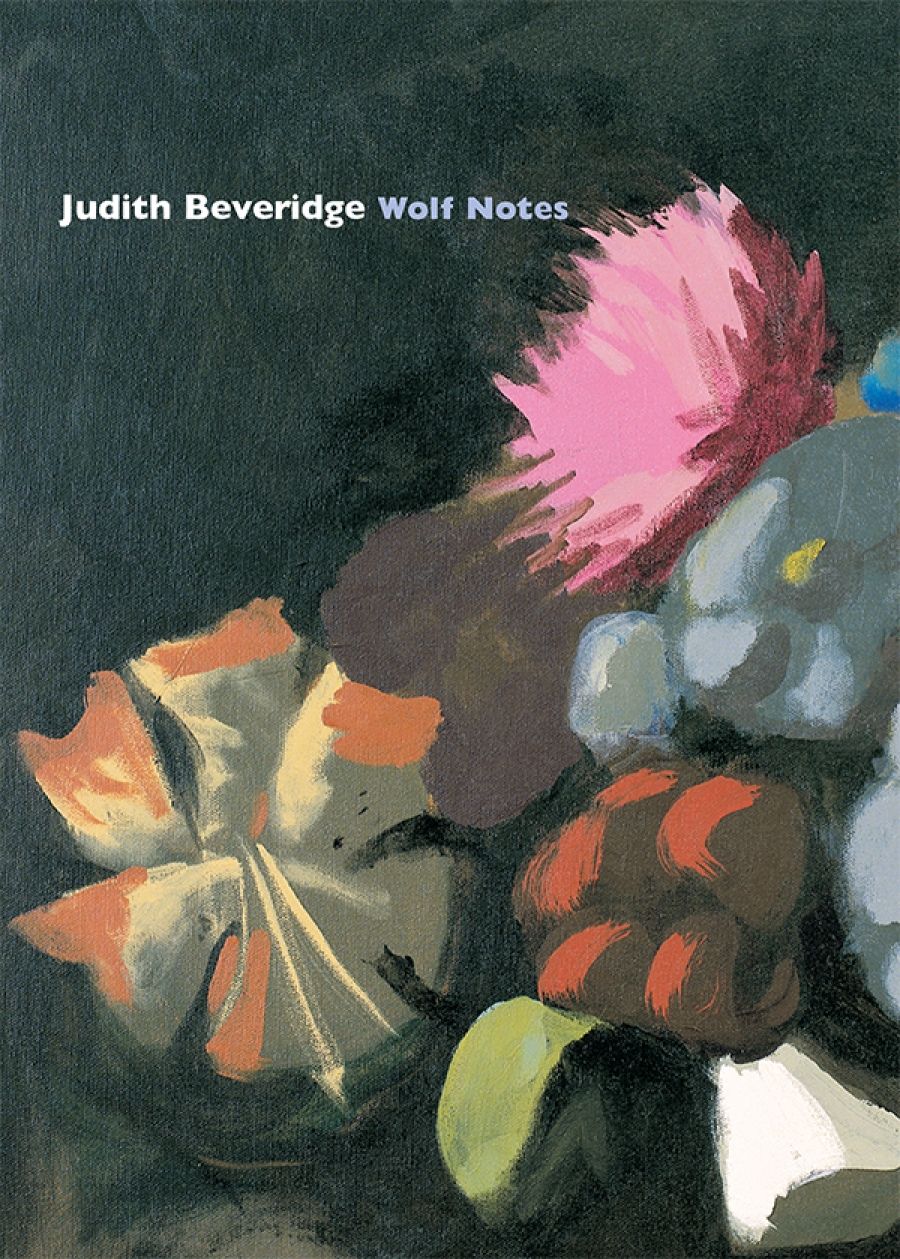
- Free Article: No
- Contents Category: Poetry
- Review Article: Yes
- Online Only: No
- Custom Highlight Text:
Admirer’s of Judith Beveridge’s distinctive talent have had a long wait between collections (it’s eight years since Accidental Grace), although she has been published consistently in anthologies and journals, and poems from the central sequence of this collection, ‘Between the Palace and the Bodhi Tree’, won the 2003 Josephine Ulrick National Poetry Prize. Patience is rewarded: this is a collection of impressive poetic maturity.
- Book 1 Title: Wolf Notes
- Book 1 Biblio: Giramondo, $22 pb, 124 pp
It is, after all, a confident poet who offers this explanatory note to her title: ‘Wolf Note: (music, def:) a discordant or false vibration in a string due to a defect in structure or adjustment of the instrument.’ Nothing could seem further from discords or false vibrations than the music of Beveridge’s poems. She deploys a number of poetic forms, but always without showiness, hardly ever with the sense of mere technical exercise. There is, throughout, a kind of authoritative composure to her writing, a quality of ‘quiet amplitude’ that she attributes even-handedly in ‘The Lake’ to poetry and to nature.
Yet these are poems that quite often leave an edgy, uneasy aftertaste, and not just for the more gothic moments of ‘Exsanguination’ or ‘The Bone Artisan’ (‘A vulture’s skull makes an excellent / scuttle’). There is a tension in the sensibility, a sense that human beings must struggle to respond truly to the world and to life within it, to resist those who say that truth ‘can’t be scratched open’ (‘The Vow’), or who believe that it is ‘the domain of a topknotted / squad who claim to have heredity’s / nod to lord it over everyone’ (‘Brahmins’). These are from ‘Between the Palace and the Bodhi Tree’ and Beveridge’s Buddha is not the smiling reposeful Buddha of achieved enlightenment. His quest for his ‘implicate law’ is disturbed by doubts and sore feet and distracted by memories of his ‘newly shining son’, by guilt for the grief of wife and father, and by the white noise of ideologies. The vows he makes when he reaches the bodhi tree are to wait for a future in which things will have changed. Perhaps the most paradoxical change must be that he will ‘no longer want / to burgeon in paradise’.
Beveridge has a fine ear for the internal contradictions of human desire — for the way we are pulled between palace and bodhi tree, flesh and spirit, earth and sky. Remarkably finely tuned to nature’s particularities, she knows, nonetheless, the plangency of the desire for unity in ‘the cycles / seasons enjoy with the sun’. She also knows how, given the way of the world, the most ‘natural’ desires can cause conflict, as in ‘Rice’, where the uproar of farmers guarding their crop against marauding elephants reduces to unresolvable fact:
The animals
are hungry, the men are hungry —
and they are all craving the rice.
The Buddha may have to wait long for ‘Greed-driven life cycles’ to be eaten up (‘Ficus Religiosa’); meanwhile, awareness of their power fuels the mixture of fascination and repulsion with which Beveridge revisits an earlier theme, fishing and fishermen.
Where themes of conflict and unity are involved, we are culturally accustomed to a metaphoric repertoire counterposing the forces of light and darkness. The dominant terms for Beveridge, however, are weight and lightness. So ‘the loss of hope’s particulars’ is felt by the woman in ‘Woman and Child’ as a ‘heaviness in her head’, and the saffron picker, driven by her children’s hunger and the monstrous knowledge of how many crocuses she must pick to make ‘a spoonful heavy’, feels ‘Always that weight in her apron: the indivisible / hunger that never has the levity of flowers’. Weightedness is the more common experience for the inhabitants of Beveridge’s world; that of lightness, brief and intense, is perhaps the one paradisal moment granted humanity. When the Buddha lets go of the rocklike thoughts he has been ‘dredging up from the pit of myself’, he feels ‘like a bird / floating in the clear, excavated air’ (‘Quarry’). For the boy in ‘Bahadour’, intense absorption in the flight of his kite releases him from the weight of drudging poverty and homesickness, giving him a claim to ‘some acre of sky within a hard-fisted / budget’ as he experiences ‘rapturous finesse’ in ‘The Kite’.
As for Beveridge, one shouldn’t make her sound too solemn. She is a wittily imaginative poet, still capable of evoking — in ‘The Divination of Dogs’, for instance —the startled delight with which her first readers encountered in ‘The Domesticity of Giraffes’. There is lightness of touch, too, in her choice of characters for the almost obligatory task of writing about writing: ‘The Dice-Player’, ‘Pedlar’, ‘The Bone Artisan’ and ‘The Courtesan’. It’s even arguable whether I’m justified in reading the first three in this way, since nothing explicit is allowed to break the detail of their naturalistic surface. The courtesan, however, is both explicit and modest:
Poetry, never one of my accomplishments,
came to me one day in the yard. I can no better
explain it than I can the wind blowing its bell-likescales into these chimes. I can’t remember what
I composed, only that my voice seemed to turn
into a wind-crafted charm …
Perhaps, however, it is the human craft that has so clearly gone into Beveridge’s poetry that makes this collection an enchantment not easily forgotten.


Comments powered by CComment